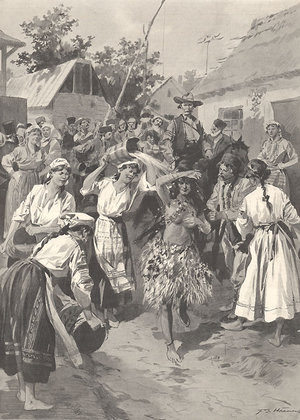
Paparuda
Encyclopedia

Culture of Romania
Romania has a unique culture, which is the product of its geography and of its distinct historical evolution. Like Romanians themselves, it is defined as the meeting point of three regions: Central Europe, Eastern Europe, and the Balkans, but cannot be truly included in any of them...
and Bulgarian rain ritual, probably of pagan
Paganism
Paganism is a blanket term, typically used to refer to non-Abrahamic, indigenous polytheistic religious traditions....
origin, performed in the spring and in times of severe drought.
A girl, wearing a skirt made of fresh green knitted vines and small branches, sings and dances through the streets of the village, stopping at every house, where the hosts pour water on her. She is accompanied by the people of the village who dance and shout on the music. The custom has attributed a specific type of dance and a specific melody.
A similar Romanian rain ritual is the Caloian
Caloian
Caloian is a rain ritual in Romania, similar in some ways with Paparuda. It is mostly found in Wallachia . The origin of this ritual, as many other local popular beliefs and practices, precedes the spreading of Christianity, although it was in time associated with the period of the Orthodox...
.
The name is probably derived from Perperuna, which in its turn is a Slavic (south slavic) goddess, or as Sorin Paliga suggests, is a divinity from the local Thracian
Thracians
The ancient Thracians were a group of Indo-European tribes inhabiting areas including Thrace in Southeastern Europe. They spoke the Thracian language – a scarcely attested branch of the Indo-European language family...
substratum.
Like the Dodola
Dodola
Dodola , Perperuna or Preperuša is an old Slavic tradition....
(dudula, dudulica, dodolă in Romanian, dudulë in Albanian, tuntule in Greek, dudulya and didilya in South Slavic languages), which is another name for the same custom holding similar rituals, compared by Decev with Thracian
Thracians
The ancient Thracians were a group of Indo-European tribes inhabiting areas including Thrace in Southeastern Europe. They spoke the Thracian language – a scarcely attested branch of the Indo-European language family...
anthroponyms (personal name
Personal name
A personal name is the proper name identifying an individual person, and today usually comprises a given name bestowed at birth or at a young age plus a surname. It is nearly universal for a human to have a name; except in rare cases, for example feral children growing up in isolation, or infants...
s) and toponyms (place names) (such as Doidalsos, Doidalses, Dydalsos, Dudis, Doudoupes, etc.) and argued by Paliga to be of Thracian origin, the Paparuda is found only at Romanians
Romanians
The Romanians are an ethnic group native to Romania, who speak Romanian; they are the majority inhabitants of Romania....
(păpărudă), Aromanians
Aromanians
Aromanians are a Latin people native throughout the southern Balkans, especially in northern Greece, Albania, the Republic of Macedonia, Bulgaria, and as an emigrant community in Serbia and Romania . An older term is Macedo-Romanians...
(pirpirună) and South Slavs
South Slavs
The South Slavs are the southern branch of the Slavic peoples and speak South Slavic languages. Geographically, the South Slavs are native to the Balkan peninsula, the southern Pannonian Plain and the eastern Alps...
(peperuda, perperuna).
The name of Dodola is possibly cognate with the Lithuanian word for thunder: dundulis.

